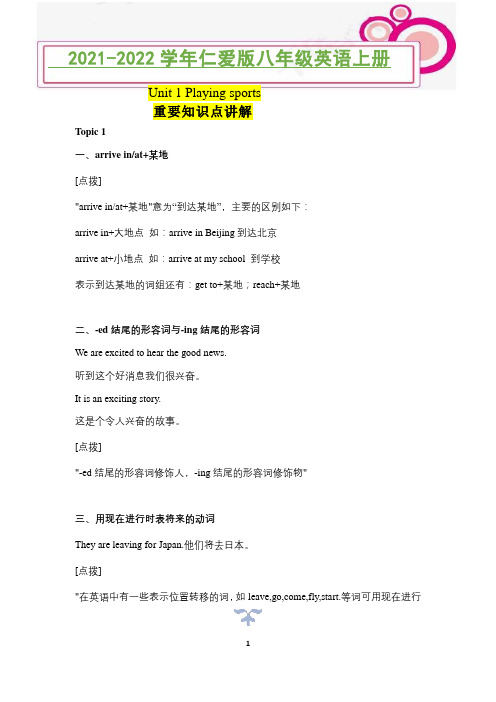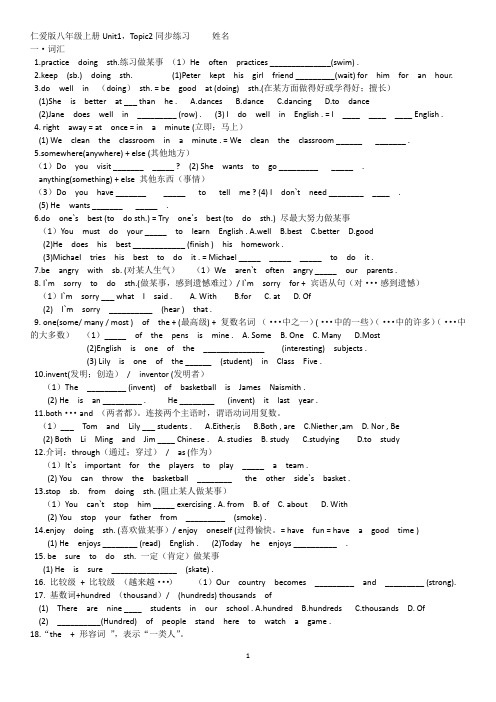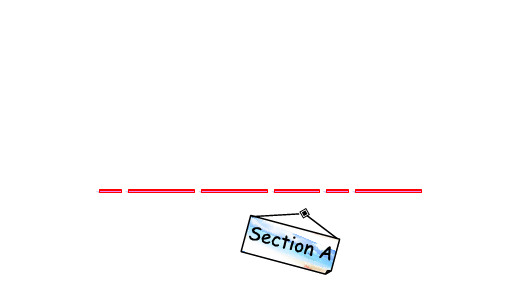仁爱版八年级(上册)英语教材同步详解
仁爱版八年级英语上册 Unit 3 Topic 1 Section A 课件(共21张PPT)全

7. I _pr_ef_er___ playing soccer.
Summarize the ways of talking about hobbies!
1. I love singing and playing the guitar. 2. I am interested in playing basketball. 3. I enjoy dancing to music. 4. I like sleeping. 5. I like reciting poems. 6. I am fond of acting. 7. I prefer playing soccer.
different hobbies. I like…
Different ways of talking about hobbies:
…love/enjoy/like/prefer/am interested in/am fond of …
Written work
提升练习
Use the sentence patterns we just have learned to write a passage about your group members’ hobbies.
视频1a-P55
go fishing
enjoy reading stories
go to the movie theater
love reciting poems enjoy listening to music watch DVDs at home
Read 1a and fill in the blanks.
1. I love _si_ng_in_g___and playing the guitar.
Unit1 ---unit2重要知识点讲解2021-2022学年仁爱版八年级英语上册

Unit 1 Playing sports重要知识点讲解Topic 1一、arrive in/at+某地[点拨]"arrive in/at+某地"意为“到达某地”,主要的区别如下:arrive in+大地点如:arrive in Beijing到达北京arrive at+小地点如:arrive at my school 到学校表示到达某地的词组还有:get to+某地;reach+某地二、-ed结尾的形容词与-ing结尾的形容词We are excited to hear the good news.听到这个好消息我们很兴奋。
It is an exciting story.这是个令人兴奋的故事。
[点拨]"-ed结尾的形容词修饰人,-ing结尾的形容词修饰物"三、用现在进行时表将来的动词They are leaving for Japan.他们将去日本。
[点拨]"在英语中有一些表示位置转移的词,如leave,go,come,fly,start.等词可用现在进行时表示将来。
"四、be going to结构I am going to play basketball.我将去打篮球。
[点拨]"be going to"是将来时态的一种结构,意为“将要”,be动词的单复数与句子主语的人称和数保持一致。
否定形式:be not going to一般疑问句形式:Be+主语+going to+动词原形?特殊意为句形式:Wh-疑问词+be going to+动词原形?表将来的常用结构:will do;be about to do.五、向对方发出邀请的句型-Would you like to come and cheer us on?你愿意来为我们加油吗?-Sure,I'd love to.当然,我很乐意。
[点拨]"Would you like to+动词原形?"用于向对方发出邀请。
英语仁爱版八年级上册Unit1 Topic2同步练习及答案

仁爱版八年级上册Unit1,Topic2同步练习姓名一·词汇1.practice doing sth.练习做某事(1)He often practices ______________(swim) .2.keep (sb.) doing sth. (1)Peter kept his girl friend _________(wait) for him for an hour.3.do well in (doing)sth. = be good at (doing) sth.(在某方面做得好或学得好;擅长)(1)She is better at ___ than he . A.dances B.dance C.dancing D.to dance(2)Jane does well in _________ (row) . (3) I do well in English . = I ____ ____ ____ English .4. right away = at once = in a minute (立即;马上)(1) We clean the classroom in a minute . = We clean the classroom ______ _______ .5.somewhere(anywhere) + else (其他地方)(1)Do you visit _______ _____ ? (2) She wants to go _________ _____ .anything(something) + else 其他东西(事情)(3)Do you have _______ _____ to tell me ? (4) I don`t need ________ ____ .(5) He wants _______ _____ .6.do one`s best (to do sth.) = Try one`s best (to do sth.) 尽最大努力做某事(1)You must do your _____ to learn English . A.well B.best C.better D.good(2)He does his best ____________ (finish ) his homework .(3)Michael tries his best to do it . = Michael _____ _____ _____ to do it .7.be angry with sb. (对某人生气)(1)We aren`t often angry _____ our parents .8. I`m sorry to do sth.(做某事,感到遗憾难过)/ I`m sorry for + 宾语从句(对···感到遗憾)(1)I`m sorry ___ what I said . A. With B.for C. at D. Of(2) I`m sorry __________ (hear ) that .9. one(some/ many / most ) of the + (最高级) + 复数名词(···中之一)(···中的一些)(···中的许多)(···中的大多数)(1)_____ of the pens is mine . A. Some B. One C. Many D.Most(2)English is one of the ______________ (interesting) subjects .(3) Lily is one of the ______ (student) in Class Five .10.invent(发明;创造)/ inventor (发明者)(1)The _________ (invent) of basketball is James Naismith .(2) He is an _________ . He ________ (invent) it last year .11.both···and (两者都)。
仁爱版英语八年级上册Unit3Topic2《Whatsweetmusic》(SectionC)说课稿

仁爱版英语八年级上册Unit 3 Topic 2《What sweet music》(SectionC)说课稿一. 教材分析仁爱版英语八年级上册Unit 3 Topic 2《What sweet music》(Section C)是一篇关于音乐欣赏的阅读材料。
通过讲述一篇关于一位音乐家和他的音乐的故事,让学生在阅读过程中感受音乐的美丽,提高他们的阅读理解能力和音乐鉴赏能力。
此篇课文内容丰富,语言优美,贴近学生生活,有助于激发学生对音乐的热爱。
二. 学情分析八年级的学生已经具备了一定的英语基础,对音乐有一定的了解和兴趣。
但他们在阅读理解、词汇运用和音乐鉴赏方面还存在一定的困难。
因此,在教学过程中,教师需要关注学生的个体差异,充分调动学生的积极性,引导他们主动参与课堂活动。
三. 说教学目标1.知识目标:让学生掌握 Section C 课文中的关键词汇和句型,提高阅读理解能力。
2.能力目标:培养学生运用英语进行交流的能力,提高音乐鉴赏能力。
3.情感目标:激发学生对音乐的热爱,培养他们欣赏美好事物的能力。
四. 说教学重难点1.教学重点:课文的理解和词汇的掌握。
2.教学难点:音乐术语的理解和运用,阅读策略的培养。
五. 说教学方法与手段1.教学方法:采用任务型教学法,让学生在完成任务的过程中提高英语运用能力。
2.教学手段:利用多媒体课件、音频和视频材料,激发学生学习兴趣,提高课堂效果。
六. 说教学过程1.Pre-reading:引导学生谈论自己对音乐的喜爱,激发学习兴趣。
2.While-reading:分组阅读课文,讨论课文内容,回答问题。
3.Post-reading:学生展示自己的音乐作品,进行音乐欣赏和评价。
七. 说板书设计板书设计应简洁明了,突出重点。
可采用思维导图的形式,将课文内容、关键词汇和音乐术语进行整理,帮助学生巩固记忆。
八. 说教学评价1.课堂参与度:观察学生在课堂活动中的积极参与情况,评价他们的学习态度。
2019年仁爱版英语八年级上册同步练习册答案

Topic 1 I’m going to play basketball.
Section A 一、⒈join ⒉tennis ⒊practice ⒋against ⒌skating 二、⒈C ⒉B ⒊D ⒋D ⒌A 三、⒈B ⒉C ⒊A ⒋E ⒌D 四、⒈like better ⒉isn’t going to practice ⒊Are they going; they aren’t ⒋What is; going to do ⒌Both my sister and I like playing the guitar.
I think I will have a happy weekend.
Topic 2 I’ll kick you the ball again.
Section A 一、⒈ill ⒉mind ⒊throw ⒋Certainly ⒌somewhere 二、⒈A ⒉B ⒊B ⒋D ⒌C 三、⒈B ⒉E ⒊C ⒋A ⒌D 四、⒈right away ⒉somewhere else ⒊could you please ⒋Never mind ⒌fell ill
Section B 一、⒈angry ⒉fighting ⒊finish ⒋nothing ⒌grandfather 二、⒈B ⒉B ⒊A ⒋B ⒌B 三、⒈B ⒉A ⒊E ⒋D ⒌C 四、⒈is good at ⒉bought me a basketball ⒊my drawing ⒋got/was angry with ⒌passed me her new photo
That’s all! Thanks.
综合提升
一、⒈A ⒉D ⒊B ⒋B ⒌D ⒍C ⒎B ⒏A ⒐D ⒑B 二、⒈What’s your favorite sport? ⒉What about you? ⒊Who is your favorite player? ⒋Are you going to be a(ping-pong) player like him? ⒌What are you going to be when you grow up? 三、⒈D ⒉A ⒊D ⒋B ⒌C ⒍D ⒎A ⒏D ⒐B ⒑C 四、⒈B ⒉B ⒊D ⒋D ⒌A 五、⒈C ⒉A ⒊B ⒋D ⒌健身中心
仁爱版英语八年级上册:Unit 1 Topic 3 The school sports meet is coming. Section A 课件(共22张PPT)

What are you going to do this weekend?
I am going to practice running.
practice running
Ws meet is coming. I am going to take part in it.
the 800-meter race.
800m
the high jump the long jump
100-meter race 200-meter race
school sports meet
relay race
400-meter race 800-meter race
basketball football running
in the school sports meet. Kangkang: Yes, I will. Li Ming: Which sport will you take part in? Kangkang: I don’t like jumping. I’m good at running.
仁爱版八年级英语上册
仁爱版八年级英语上册一、重点词汇解析1. almost /ˈɔːlməʊst/:几乎,差不多。
-例句:It's almost time to go.(差不多该走了。
)-辨析:nearly 和almost 意思相近,但在具体用法上略有不同。
almost 可与no,none,nothing,never 等否定词连用,而nearly 一般不与这些否定词连用。
2. beat /biːt/:(在比赛或竞争中)赢,打败。
-例句:Our team beat theirs in the football match.(在足球比赛中我们队打败了他们队。
)-辨析:win 和beat 都有“赢”的意思,但用法不同。
win 后接比赛、奖品、战争等名词;beat 后接人或团队。
3. exciting /ɪkˈsaɪtɪŋ/:令人兴奋的,使人激动的。
-例句:The football game was very exciting.(这场足球比赛非常令人兴奋。
)-辨析:exciting 修饰事物,表示“令人兴奋的”;excited 修饰人,表示“感到兴奋的”。
4. although /ɔːlˈðəʊ/:虽然,尽管。
-例句:Although he is young, he knows a lot.(虽然他很年轻,但他知道很多。
)-辨析:although 和though 意思相同,都可引导让步状语从句,但although 比though 更正式。
5. pleasant /ˈpleznt/:令人愉快的,舒适的。
-例句:We had a pleasant trip.(我们有一次愉快的旅行。
)-辨析:pleasant 和pleased 都有“愉快的”意思,但用法不同。
pleasant 修饰事物;pleased 修饰人,表示“感到愉快的”。
二、重点短语1. take part in:参加。
-例句:I took part in the sports meeting.(我参加了运动会。
仁爱版英语八年级上册Unit1Topic3SectionC说课稿附英文教案
2a、2b是本课教学内容的第二部分。我将2a、2b进行了整合。2a1主要操练There will be将来结构。在这个环节我设计了一个情景:请一名学生扮演来自奥委会的工作人员,在采访人们心目中2008北京的蓝图。通过问答形式巩固句型。2a2主要练习we should…这个句型。在处理2a2时我采用了以小组为单位,大家一起进行头脑风暴,用we should…造尽可能多的句子,为下一步的写作做铺垫。
2)教学原则
活动性原则提倡学生主动参与,体验,交流,合作,探究等多种学习。
合作性原则以学生为主体,师生合作,生生合作,体现教与学的互动。
任务型原则任务驱动——激发动机;任务完成——激励学习积极性;
执行任务——培养责任心和合作精神。
情感性原则激发学生ቤተ መጻሕፍቲ ባይዱ习英语的兴趣和始终保持良好的学习情绪。
3)教法运用
本课主要运用“整体教学法”,并辅助任务型语言教学法、情景交际法和听说法。
3)教学重点及难点
①教学重点:理解课文文章内容;学习本课新单词、短语和句型。培养学生合作学习的意识。
②教学难点:掌握There be的将来结构。掌握本课新单词、短语和句型并能将新知识运用到写作中。
理论依据:①根据教学目标,确定本课新单词、短语。掌握并熟练运用There be的将来结构是本课的重点和难点。一般将来时态是课程标准要求学生掌握的重要时态之一,在本课基本句型There will be…中,学生容易忽略be动词。因此要注意对学生进行正确的语言输入。②本课课型为读写课。《英语课程标准》对初中阶段的写作目标提出了具体的要求:能根据写作要求,收集准备素材;能根据图示写简单的文章、写日记、写信等。教师应引导学生写出书写端正、拼写正确、语句通顺、语法规范、层次分明的一封短信。
初中英语英语八年级上册知识点梳理ppt 仁爱版优秀PPT课件
•享受做某事的乐趣 •练习做某事 •完成做某事 •坚持做某事 •继续努力 •使某人坚持做某事 •保证安全 •帮助某人 •擅长,在---方面做得好 •到处乱扔 •其他某个地方
•enjoy doing--•practice doing--•finish doing--•keep doing--•Keep trying! •keep sb. doing--•keep safe •help sb. /give sb. a hand •be good at--- /do well in--•throw--- around /throw--- about •somewhere else
•刚才我看见他正在体育馆里做锻炼。 •I saw him exercising in the gym just now.
•游•W泳hic和h s滑po冰rt d相o y比ou,pr你efe更r, s喜wim欢m哪ing项o运r sk动ati?ng我? I更pre喜fer欢游泳。
swimming . •Which sport do you like better, swimming or skating? I like swimming better.
新版仁爱英语八年级上册
知识点梳理
2016 01 16
打算做某事 看见---做--看见---正在做--在暑假期间 为某人加油 两者都 常常,相当经常 更喜欢 更喜欢做--与---相比更喜欢--最喜欢
Unit 1,Topic1知识点
一、重点短语
•be going to do--- /plan to do--•see --- do--•see ---doing--•during the summer holidays •cheer--- on •both--- and--- /both of--•quite a bit/quite a lot/very often •prefer /like --- better •prefer doing--- /prefer to do--•prefer A to B •favorite /like ---best
【仁爱版】八年级英语上册Unit1同步练习(含答案)【精校版】
仁爱版精品英语资料(精校版)Unit1 Playing Sports一、单词拼写(根据中文提示拼写单词)1. I (赢) the first prize yesterday.2. The activities of learning from Lei feng in our school is very (受欢迎) with students.3. The boy tried not to (打破) the glass, but he failed(失败).4. Jack takes an (积极的) part in volunteers during summer vocations.5. She eats lots of (健康的) food.6. Doing more listening (练习) every day is very important.7. I want to (提高) my English, so I make friends with an American girl.8. Our teacher often (鼓励) us to speak English.9. The (现代的) computers have been in use for a month.10. It's good to form a (习惯) of reading.11. She (赢得) two tickets for the concert in the competition.12. Dao Lang's songs are quite (流行的) today in the whole country.13. Take care not to (打破) the glass.14. That's my grandmother. She is 84. You wouldn't believe how (活跃的) she is!15. If you want to keep (健康), you'd better take more exercise.二、单词拼写(单句首字母填空)16. If I f these tasks, we can go to the concert.17. She can speak three f languages, such as English, French and Japanese.18. Every year many v come to Tibet and they are surprised to see the beautiful place.19. Tina looks very t , and she should have a good rest.20. After the film, she becomes f . There are always a lot of fans waiting outside her house.21. He often goes to bed after he f his homework.22. My uncle can speak three f languages—English, French and Japanese.23. There are many v coming to visit our country every year.24. The girl has lots of homework to do every day. So she is very t .25. Zhou Jielun is f as a singer in China.三、翻译(根据中文提示完成句子)26. 明天你打算干什么?What you tomorrow?27. 也许你会为他们不能找到解决空气污染问题的方法而担心。
- 1、下载文档前请自行甄别文档内容的完整性,平台不提供额外的编辑、内容补充、找答案等附加服务。
- 2、"仅部分预览"的文档,不可在线预览部分如存在完整性等问题,可反馈申请退款(可完整预览的文档不适用该条件!)。
- 3、如文档侵犯您的权益,请联系客服反馈,我们会尽快为您处理(人工客服工作时间:9:00-18:30)。
.. . 下载可编辑 . 八年级上册Unit 1 topic 1 Section A 1. I saw you play basketball almost every day during the Summer holidays. 常见的感官动词有:see, watch, hear, smell, feel 等。后可接①动词ing形式,表此动作正在发生。②动词原形,不表此动作正在发生, 表此动作已完成或存在的事实。 ① Do you smell something ? (burn) 答案:burning ② I often see him basketball after class. ( play ) 答案:play 2. There is going to be a basketball game between Class Three and our class this Sunday. There be 句型:表某地有某物. 而have 表示某人有… (1)There is/ are..表现在某地有某物,is/are取决于后面的名词是单数还是复数,单数用is复数用are,如①There is a pen and two rulers on the desk.②There are two rulers and a pen… (2) There was/were…表过去某地有某物。was/were的用法也遵循就近原则。 (3)There will be 或 There is/are going to be 表某地将有某事物。不能说成 There will have… (题) a match in our school between Class Three and Class Four next week. 3. Would you like to come and cheer us on? ----- Sure, I’d love to. (1)Would you like + 不定式? 表建议或邀请。常用I’d love to 来回答,不同意也常用 “I’d love to, but… ”来拒绝别人。如:Would you like to play basketball with me ?--- I’d love to, but I have a lot of homework to do. (2)在肯定句中 would like= want 如: I’d like to have a rest. = I want to have a rest. 4. I hope our team will win.---- Me , too.(= So do I.) ① hope + that从句,that 可省去。I hope that I can see you soon. ② hope to do sth. I hope to see you soon. 注意: (1)wish(愿)与hope的用法一样,后既可以接从句也可以接不定式,但不能说 hope sb. to do sth. (hope 后不接双宾语, 但 wish 可以),如: I hope you to help me (错) I hope that you can help me.(对) (2)hope 后接的从句常用将来时态表可以实现的愿望,而wish 后接的宾语从句常用过去时态表难以实现的愿望,如: ①I hope you will come. ②I wish I could fly to the moon. 5. I prefer rowing. (1)prefer(过去式\过去分词需双写 preferred) 后可直接接动词ing形式或动词不定式, 表更喜欢…, 用法同like/ love: ①I prefer swimming (更喜欢经常游泳) ②I prefer to swim.(更喜欢这一次去游泳) (2)prefer (doing) A to (doing) B 相当于:like… better than… I prefer swimming to skating. ==I like swimming better than skating. (3) 后接不定式时与rather than 或instead of连用,如:He preferred to die rather than (to) steal. / He preferred to die instead of stealing. 他宁死也不去偷窃。 .. . 下载可编辑 . 6. -----Do you row much ?你经常划船吗?----- Yes , quite a bit / a lot. 是的,经常。 quite a bit/ a lot 经常/许多,大量. ①quite a bit of 后接不可数名词,如:quite a bit of money。 ②quite a lot of 后既可接可数名词复数也可以接不可数名词,如:quite a lot of books/ information。而③quite a few=many 表“相当多”后接可数名词复数,如:quite a few students④quite a little =much表许多,后接不可数名词,如; quite a little money ⑤very few / little 很少很少。 7. Are you going to join the school rowing club? ①join 加入(人群,组织) ②take part in 参加(活动,比赛) 注意:(1)join可与in连用,后接活动,即 take part in=join in = be in后都接活动。如:①He joined in the game ;②He joined in helping the old man. ③I’ll be in the relay race. (2) Join sb. in doing sth. 表加入某人的活动。 如:Will you join us in playing basketball ?
Section B 1. How tall is he, do you know?----- Yes. He is 2.26 meters tall. 与how构成的疑问词有:How tall(身高)多高; how high(山)多高;how heavy多重;how long 多长;How wide 多宽;how deep 多深;how old 多大…. 对应的回答常用“数词+量词+形容词”,如:1.70 meters tall; 2 kilometers high; 3 kilos heavy; 20 years old 2. They both play for the Houston Rockets in the NBA. play for 为某个队效力;play against 与某个队比赛;play with 玩某物/与某人玩 (比较:play basketball 打篮球;Look, the baby is playing with a basketball 玩弄一个篮球) 3. what are you going to be when you grow up ?= what do you want to be …?你长大想干什么? 5. David Beckham, a famous soccer star, arrived in Beijing with his team yesterday. 表到达的有:①arrive at + (小地名);arrive in +(大地名)② get to ③ reach 6. The fans are very excited. (1)excited 表“感到激动的、兴奋的”,常只作表语,主语常为人。如:We are excited. 类似的有:interested有趣的; tired感到疲劳的; bored感到厌烦的 (2)exciting 表“令人激动兴奋的”既可作定语,也可作表语;作表语时,主语常为事物,如:①an interesting book; ②The book is interesting. 类似的有:interesting令人有趣的; tiring令人感到疲劳的; boring令人感到厌烦的 7. It’s too bad that they aren’t going to stay in Beijing for long. 主语是斜体that从句部分,前用it 来代替它。因此这是一个含主语从句的复合句。 It’s too bad that…= It’s a pity that…= It’s a shame that..很遗憾….. 8. 在英语中有一些表示位置移动的词,如:go,come,leave, arrive, fly 可用现在进行时态表将来。如:They are flying to Wuhan tomorrow. (表将飞往武汉而不是正去武汉) They are leaving for Japan.= They will leave for Japan. 9. Zhang Yining, one of the world’s best women table tennis players, won two gold medals for China. (1)one of 表… 中的一个,后接可数名词的复数,如:one of my friends
